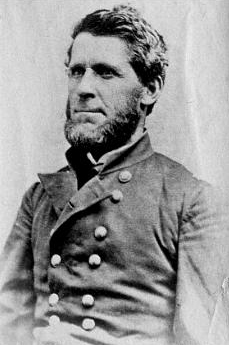William Grose facts for kids
Quick facts for kids
William Grose
|
|
|---|---|

William Grose
|
|
| Born | December 16, 1812 Dayton, Ohio |
| Died | July 30, 1900 (aged 87) New Castle, Indiana |
| Place of burial |
South Mound Cemetery, New Castle, Indiana
|
| Allegiance | United States of America Union |
| Service/ |
United States Army Union Army |
| Rank | |
| Battles/wars | American Civil War |
William Grose (December 16, 1812 – July 30, 1900) was an important American figure. He was a lawyer, a politician, and an author. During the American Civil War, he became a brigadier general in the Union Army. He fought in many major battles and was known for being brave. People said he was "always seen where the bullets flew thickest."
Contents
Early Life and Education
William Grose was born in Dayton, Ohio, in 1812. His family had a history of serving in the military. His father fought in the War of 1812 against the British. His grandfather, Jacob Grose, died fighting in the American Revolution.
In 1813, Grose's family moved to Fayette County, Indiana. Later, in 1829, they moved to Henry County. As a young person, William worked hard on a farm. He also worked in a local brickyard.
William Grose studied law in New Castle, Indiana. He lived there for the rest of his life. In 1842, he passed his law exam. He then started a very successful law business.
Political Career Before the War
William Grose also had an interest in politics. In 1852, he tried to become a member of the United States Congress. He ran as a member of the Democratic Party, but he did not win.
Later, he changed his political party. In 1856, he attended the Republican National Convention. This was a big meeting where the Republican Party chose who they wanted to be president. Grose supported John C. Fremont, but Fremont did not win the election. In 1860, William Grose was elected as a judge. He served on a local court in Indiana.
Serving in the Civil War
When the American Civil War began, William Grose joined the Union Army. In October 1861, he became a colonel. He led the 36th Indiana Infantry regiment. He helped recruit and train the soldiers in this group.
Early Battles and Injuries
Grose led his regiment in the Battle of Shiloh. During this battle, his horse was shot from under him. He also received a small wound in his shoulder. Soon after, he took command of a larger group of soldiers called a brigade. This was because the previous commander, Brigadier General Jacob Ammen, was wounded.
Grose continued to fight in many important battles. He chased Braxton Bragg's army during the Kentucky Campaign. Another one of his horses was killed at the Battle of Stones River.
Key Campaigns and Promotions
In 1863, Grose fought in the Tullahoma Campaign. He was also wounded in the neck during the Battle of Chickamauga. Later that year, he and his soldiers did very well in the Chattanooga Campaign. They helped attack Lookout Mountain. Their actions were praised in official reports.
The next year, Grose led his brigade in the Atlanta Campaign. This campaign was led by William T. Sherman. In July 1864, during the Siege of Atlanta, Grose was promoted. He became a brigadier general of U.S. Volunteers. He commanded a brigade in a division led by Major General Nathan Kimball.
Grose's army then went north to chase John Bell Hood's army. They fought in the Franklin-Nashville Campaign. In this campaign, Hood's army was almost completely destroyed. In August 1865, Grose was given an honorary promotion to major general. This is called a "brevet" promotion.
Life After the War
After the Civil War ended, William Grose stayed in the Regular Army for one year. He then left the army in January 1866. He went back to New Castle, Indiana, and continued his law practice.
President Andrew Johnson chose him for a government job. Grose became the collector of internal revenue taxes for his area. He held this job until 1874.
Grose was also interested in helping his community. He joined an Indiana commission. This group supervised the building of mental hospitals. In 1878, he tried again to win a seat in Congress, but he lost by a small number of votes.
In 1887, Grose returned to politics. He successfully ran for a seat in the Indiana State Senate. In 1891, he wrote a book about the history of the 36th Indiana Infantry regiment. He also actively participated in reunions for the veterans of his regiment.
William Grose passed away at the age of 87 in his home in New Castle, Indiana. He was buried in South Mound Cemetery.
Today, the Gen. William Grose House in New Castle is a historical site. It is the home of the Henry County Historical Society and is open to visitors.
Images for kids
 | Anna J. Cooper |
 | Mary McLeod Bethune |
 | Lillie Mae Bradford |


